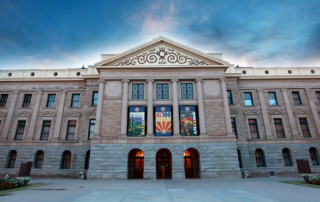Ensuring Government Accountability & Protecting Legal Rights of All Arizonans
The Arizona Center for Law in the Public Interest is a nonprofit law firm that tirelessly defends the civil and legal rights of Arizonans by pursuing cases with enduring social, public health, and environmental impacts statewide. Boldly standing up for all citizens, we hold government and special interests accountable.
ACLPI Reaffirms Commitment to Civil Rights and Accountability
The Arizona Center for Law in the Public Interest (ACLPI) condemns the recent use of lethal force and other violent enforcement actions by federal immigration agents undertaken in Minneapolis, Minnesota and throughout the country. These actions have resulted in the deaths of Minneapolis residents Renee Nicole Good on January 7, 2026, and Alex Jeffrey Pretti on January 24, 2026. They follow the killing of Keith Porter, Jr. in Los Angeles on January 1, 2026, by an off-duty ICE officer, and the deaths of at least six people in ICE custody since the start of the year.
The escalating use of force by federal agents in Minnesota is terrorizing affected communities. ACLPI fears these tactics will be replicated elsewhere, including in Arizona. In fact, on January 26, federal immigration agents were filmed indiscriminately using pepper spray against peaceful protesters as the agents drove away from the area of 32nd Street and Shea Boulevard in Phoenix. On that same night, federal agents, without warning, used pepper spray against protesters, including two state lawmakers, in Tempe. Such lawless behavior undermines Arizonans’ fundamental rights to free expression, peaceful assembly, and due process of law.
ACLPI was founded more than 50 years ago on the principles of ensuring government accountability and preserving our cherished constitutional rights. As federal actions increasingly threaten those principles and impede accountability, ACLPI today reaffirms both its mission and its commitment to protecting the rights of Arizonans in the face of unlawful and abusive law enforcement tactics.
2026 Spring Celebration Event

2025 Fall Celebration Event
The Center held its fall celebration on October 16 at The Treasury 1929 in downtown Tucson, honoring Retired Justice Stanley Feldman. Proceeds from the event support the Center’s work, defending the civil and legal rights of Arizonans. Enjoy the thank you to our generous sponsors here.
What We Do
The Arizona Center for Law in the Public Interest is considered one of the most effective public interest firms in the United States, pursuing landmark cases with persistence and vigor. Our efforts have led to a more open, transparent government.For example, our work has:
• Resulted in crucial funding for schools statewide
• Improved conditions for foster children and other vulnerable populations
• Increased access to mental health care
• Protected public health by advocating for clean air and water
We are particularly drawn to cases that have widespread, lasting impact in Arizona. The cases we choose are complex but can establish powerful precedent that safeguards Arizonans’ rights and fortifies our democracy. In our eyes, these outcomes are worth the fight.
What We Fight For
We are passionate about our mission and protecting the rights of all Arizonans. Meet some of the people behind our cases. You’ll hear about their challenges, how we helped them overcome, and why our work is critical to the future of Arizona.
Meet the Attorneys Fighting for You
We understand that serious, systemic change often happens behind the scenes, with hands-on, hard work. And we have
the right people to do just that. Our attorneys and board members do what they do because they’re passionate about real,
lasting social change, preserving Arizonans’ fundamental rights, and the responsible stewardship of our state’s resources.
We understand that serious, systemic change often happens behind the scenes, with hands-on, hard work. And we have the right people to do just that. Our attorneys and board members do what they do because they’re passionate about real, lasting social change, preserving Arizonans’ fundamental rights, and the responsible stewardship of our state’s resources.
Stay Up to Date With the Centerline Newsletter
We are deeply invested in the community, improving everyone’s quality of life and protecting our most fundamental rights.
Sign up to receive ongoing updates about our cases, focus areas, advocacy, events, and fundraisers.
We are deeply invested in the community, improving everyone’s quality of life and protecting our most fundamental rights. Sign up to receive ongoing updates about our cases, focus areas, advocacy, events, and fundraisers.
Newsroom
Governor Katie Hobbs Directs AHCCCS to Create Exception Process for DDD Members, DES to Delay Hour Reductions for DDD Families
Governor Katie Hobbs announced that she has directed the Arizona Health Care Cost Containment System (AHCCCS) to ensure that the new, strengthened standardized assessment tool allows for exceptions for extraordinary care. Governor Hobbs’ announcement will increase flexibility for Arizonans with [...]
ACLPI Hires New Executive Director
The Arizona Center for Law in the Public Interest has announced the hire of its next Executive Director and Chief Litigation Counsel. Jared Keenan, formerly the Legal Director of ACLU of Arizona, has succeeded Danny Adelman, who led the Center [...]
Historic Victory in School Funding Lawsuit
Phoenix, AZ – August 13, 2025: Today, Judge Dewain Fox ruled that Arizona’s funding for the capital needs of Arizona’s public schools is unconstitutional and must be reformed. In a thorough, 114-page Order, the court explained, “After carefully and [...]



